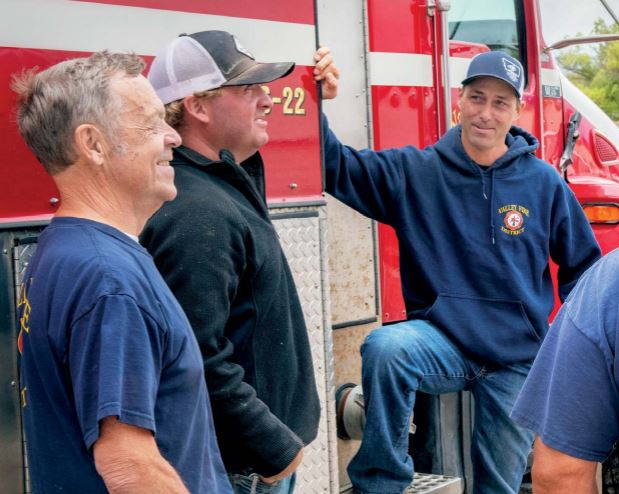Need Help
If you need help setting up services or accessing your accounts, please call our Customer Care Team at 866.552.9172 during business hours (7 a.m. — 5 p.m. PST, M-F) or email us at CustomerCare@AgWestFC.com.
Location
If you need help setting up services or accessing your accounts, please call our Customer Care Team at 866.552.9172 during business hours (7 a.m. — 5 p.m. PST, M-F) or email us at CustomerCare@AgWestFC.com.
Location
If you need help setting up services or accessing your accounts, please call our Customer Care Team at 866.552.9172 during business hours (7 a.m. — 5 p.m. PST, M-F) or email us at CustomerCare@AgWestFC.com.
Securely update and exchange balance sheet information with your AgWest team.
Put your idle cash to work with a suite of banking services that sweeps funds between accounts. Fees apply.
Nestled in the foothills along the Clark Fork River between Butte and Missoula, the town of Drummond is a cattle ranching community in western Montana with deep roots. Established in the late 1880s by the Northern Pacific Railroad, it was the site where ranchers rounded up cattle at the stockyards to head east to Chicago and beyond. Today, trains continue to travel through town, as do scenic-route seekers on the Pintler Veteran Memorial Route, but most traffic speeds along Interstate 90 bordering Drummond’s northern edge. Residents know how treacherous that highway becomes, especially in the winter, when the freezing temperatures and proximity to the river turn the roads to ice.
When accidents happen, Kim Skinner gets a call. A cattle rancher who works alongside his twin brother and parents on land his grandfather purchased more than 60 years ago, Kim is one of about 40 volunteer firefighters with the Valley Fire District who has been trained to respond to emergencies – fires, gas leaks, vehicle extrication, traffic control – in Drummond and surrounding towns. The fire district is centralized in Drummond and covers most of two counties and 30 miles of highway, with the help of three substations in the towns of Gold Creek, Hall and Maxville. Kim says the highway is a major source of the emergencies they get called to support. “Whoever can make it, they go. If you can go, you drop whatever you’re doing and head out to it,” he says.
Rural communities across the U.S. are sustained by the volunteer network of emergency responders who are ready to jump into action at all hours of the day – on top of their work, family and other obligations. They provide a trusted resource and safety net that communities depend on to thrive.
And they’re not just responding to emergencies. Kim and his fellow volunteers teach residents about prevention methods to reduce fire risk; they proactively burn dead grass in the spring. When the annual rodeo comes to town, they wash the grandstands with hoses, wet down the arena, and fill the bathrooms with water. They’re invested and connected to the land and neighbors they protect, and the community knows they have their back.

Kim Skinner, center, stands
with other Valley Fire District volunteers
Kim has volunteered with the department for 15 years. In that time, he has seen the fire district grow with additional trucks and the three substations – a big help to homeowners’ insurance, which increases significantly without a nearby fire station. When calls come in, the volunteers mobilize via group text to assess who’s available and fire up the trucks in Drummond and the nearest substation.
“They just really work together to make that community the best that it can be,” says Lacey Sutherlin, a Local Advisory Committee (LAC) member for AgWest. “They know that they are investing their time in this department to make it better for their own children in the long run.”
Through her work as an LAC advisor, Lacey brought forward the grant application from Kim to AgWest to help fund the new central fire hall in Drummond. “It was a good opportunity to support this program, knowing these guys personally and how much time they work, and the effort they put into this fire department,” she said. “They’re really the foundation of those communities.”
This summer, AgWest gave the Valley Fire District $100,000 through its LAC-guided giving program, which identifies needs in the rural communities AgWest supports. The funds will help pay down their building loan and finish construction on the facility. The fire department and its board wanted to ensure that the new facility construction would not increase the community’s tax dollars. Through local donations and the LAC grant, they can make this new fire hall a reality.
The community, in turn, rallies to support these volunteer firefighters, often through personal donations following a call or by participating in community fundraisers. This past year, after the tragic loss of one of their young volunteers in a car accident, the crew hosted a memorial reception at the fire hall. The community came out in full force and provided donations to the department which will fund a flagpole in his honor at the new facility.
As the facility nears completion, both Kim and Lacey envision how it will become a resource beyond housing vehicles, and a place area residents can be proud of. “This fire hall is a big thing for us,” said Kim. “The whole community, the valley, they all rally around us. Rural communities stand behind each other and help each other out.”